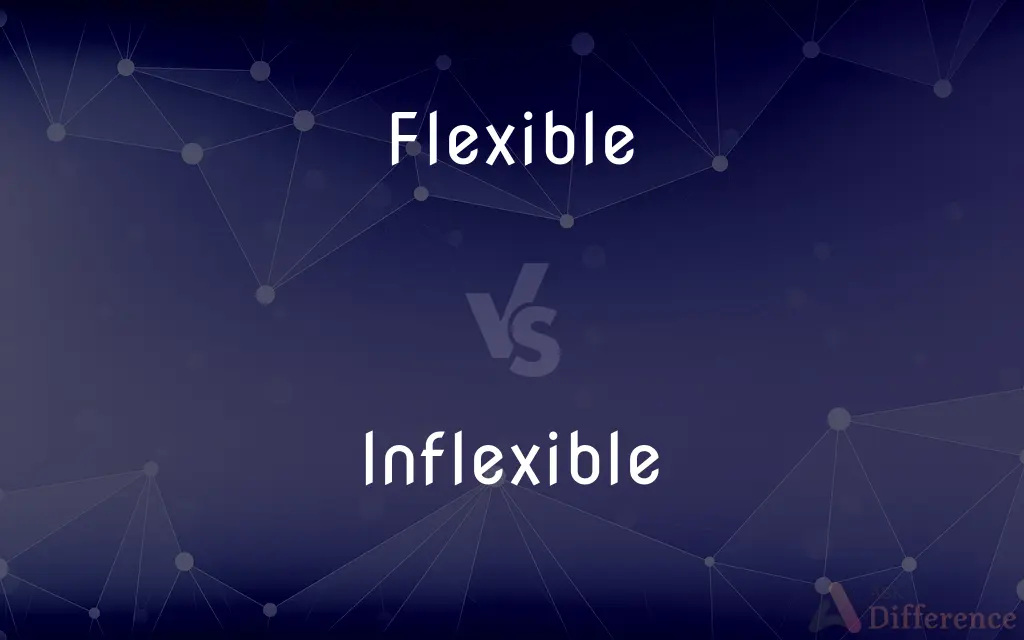Flexible vs. Inflexible — What's the Difference?
By Urooj Arif & Maham Liaqat — Updated on April 3, 2024
Flexible refers to being adaptable and willing to change, while inflexible denotes rigidity and an unwillingness or inability to change.

Difference Between Flexible and Inflexible
Table of Contents
ADVERTISEMENT
Key Differences
Flexibility is a trait or characteristic that allows for adaptability and versatility in response to changing conditions or demands. It is often regarded positively, as it enables individuals, materials, or systems to adjust effectively to new situations, challenges, or requirements. On the other hand, inflexibility is characterized by a lack of adaptability and a resistance to change. This can manifest in individuals who are set in their ways, materials that cannot bend or alter without breaking, or systems and processes that are rigid and unyielding.
In personal behavior, being flexible means having an open mind, being willing to consider alternative perspectives, and adapting one's approach based on new information. In contrast, an inflexible person might struggle with change, insist on following established routines, or resist new ideas, potentially limiting their growth and opportunities for improvement.
Materials science offers a literal interpretation of these terms. Flexible materials, like rubber, can bend or stretch under force and return to their original shape. Inflexible materials, such as glass, lack this capacity and may break under pressure. The choice between flexible and inflexible materials depends on the required application and desired properties.
In organizational contexts, flexible companies adapt to market changes, innovate, and adopt new technologies or methodologies to stay competitive. Inflexible organizations, however, may adhere strictly to traditional practices, resisting innovation, which can hinder their ability to compete in rapidly changing industries.
The value of flexibility versus inflexibility largely depends on the context. Flexibility is often crucial for innovation, learning, and development, while inflexibility can provide stability, predictability, and integrity, particularly in environments where changes are minimal or gradual.
ADVERTISEMENT
Comparison Chart
Definition
Adaptable and willing to change.
Rigid and resistant to change.
Characteristic
Open-mindedness, versatility.
Stubbornness, rigidity.
In Personalities
Embraces new ideas, can adjust to new situations.
Prefers routines, struggles with new challenges.
In Materials
Can bend or stretch without breaking.
Breaks or fails when forced to change shape.
In Organizations
Adapts to changes, innovative.
Sticks to traditional methods, resists innovation.
Advantages
Resilience, innovation, ability to navigate uncertainty.
Stability, consistency, predictability.
Disadvantages
May lack consistency.
May struggle in rapidly changing environments.
Compare with Definitions
Flexible
Capable of adapting to new, different, or changing requirements.
His flexible approach allowed him to excel in the rapidly evolving tech industry.
Inflexible
Fixed and unchangeable.
The contract terms were inflexible, leaving no space for negotiation.
Flexible
Adjustable to different conditions.
The software's flexible design makes it suitable for various users.
Inflexible
Unwilling or unable to change.
The company's inflexible policies hindered employee creativity.
Flexible
Easily bent without breaking.
The flexible wire could be shaped into various forms.
Inflexible
Unyielding in attitude or opinion.
His inflexible stance on the issue caused the negotiations to stall.
Flexible
Willing to change or compromise.
The manager was flexible with deadlines, understanding the team's workload.
Inflexible
Lacking adaptability or versatility.
The inflexible schedule left no room for unexpected events.
Flexible
Open to different ideas or opinions.
Her flexible mindset led to innovative solutions.
Inflexible
Not easily bent; rigid.
The inflexible plastic snapped when bent too far.
Flexible
Capable of bending easily without breaking
Flexible rubber seals
Inflexible
Not easily bent; stiff or rigid. See stiff.
Flexible
Capable of being bent or flexed; pliable
A flexible hose.
Inflexible
Incapable of being changed; unalterable
An inflexible rule.
Flexible
Readily bending or twisting the body without injury
You can play soccer much better if you're flexible.
Inflexible
Refusing to change one's attitude, purpose, or principles; immovable
An inflexible disciplinarian.
Flexible
Able to change to cope with variable circumstances
"a flexible and quietly competent administrator" (Jerome Karabel).
Inflexible
Not flexible; not capable of bending or being bent.
Flexible
Capable of being changed or adjusted to meet particular or varied needs
A job with flexible hours.
A flexible definition of normality.
Inflexible
Not willing to change, e.g. one's opinion or habits.
Flexible
Capable of being flexed or bent without breaking; able to be turned or twisted without breaking.
Inflexible
Not able to be changed or adapted to circumstances.
Flexible
Willing or prone to give way to the influence of others; not invincibly rigid or obstinate.
Inflexible
Not capable of being bent; stiff; rigid; firm; unyielding.
Flexible
Capable or being adapted or molded in some way.
A flexible language
Inflexible
Firm in will or purpose; not to be turned, changed, or altered; resolute; determined; unyieding; inexorable; stubborn.
"Inflexibleas steel."
A man of upright and inflexible temper . . . can overcome all private fear.
Flexible
Something that is flexible.
Inflexible
Incapable of change; unalterable; immutable.
The nature of things is inflexible.
Flexible
Capable of being flexed or bent; admitting of being turned, bowed, or twisted, without breaking; pliable; yielding to pressure; not stiff or brittle.
When the splitting windMakes flexible the knees of knotted oaks.
Inflexible
Extended meanings; incapable of change;
A man of inflexible purpose
Flexible
Willing or ready to yield to the influence of others; not invincibly rigid or obstinate; tractable; manageable; ductile; easy and compliant; wavering.
Phocion was a man of great severity, and no ways flexible to the will of the people.
Women are soft, mild, pitiful, and flexible.
Inflexible
Not making concessions;
Took an uncompromising stance in the peace talks
Uncompromising honesty
Flexible
Capable or being adapted or molded; plastic,; as, a flexible language.
This was a principle more flexible to their purpose.
Inflexible
Literal meanings;
An inflexible iron bar
An inflexible knife blade
Flexible
Extended meanings; capable of change;
A flexible character
Flexible schedules
Inflexible
Incapable of adapting or changing to meet circumstances;
A rigid disciplinarian
An inflexible law
An unbending will to dominate
Flexible
Able to flex; able to bend easily;
Slim flexible birches
Flexible
Able to adjust readily to different conditions;
An adaptable person
A flexible personality
An elastic clause in a contract
Flexible
Bending and snapping back readily without breaking
Flexible
Making or willing to make concessions;
Loneliness tore through him...whenever he thought of...even the compromising Louis du Tillet
Common Curiosities
Is it better to be flexible or inflexible?
Whether it's better to be flexible or inflexible depends on the context; flexibility is often valued for adaptability and growth, while inflexibility can provide stability and consistency.
Can flexibility be learned?
Yes, flexibility can be developed through practices that encourage open-mindedness, adaptability, and the willingness to consider alternative perspectives.
Why might someone be inflexible?
Someone might be inflexible due to a preference for routine, resistance to change, fear of the unknown, or a belief that their methods are the best.
What are the risks of being too flexible?
Being too flexible can lead to inconsistency, difficulty in setting or maintaining boundaries, and potentially compromising on important values or standards.
What does it mean to be flexible?
Being flexible means having the capacity to adjust one's behavior, thoughts, or actions in response to changing situations or information.
How does flexibility affect teamwork?
Flexibility can enhance teamwork by fostering a cooperative environment where team members are willing to adapt their roles and approaches for the team's success.
Can materials be both flexible and strong?
Yes, some materials, like certain polymers and composites, combine flexibility with high strength, making them valuable in various applications.
Can a company be too inflexible?
Yes, a company can be too inflexible, resulting in missed opportunities, inability to adapt to market changes, and decreased competitiveness.
How can one become more flexible?
Becoming more flexible involves practicing open-mindedness, challenging one’s own beliefs, adapting to new situations, and learning from diverse perspectives.
What role does flexibility play in leadership?
In leadership, flexibility is crucial for responding to unexpected challenges, managing diverse teams, and fostering innovation and growth.
Share Your Discovery

Previous Comparison
Fire vs. Passion
Next Comparison
Republican vs. LibertarianAuthor Spotlight
Written by
Urooj ArifUrooj is a skilled content writer at Ask Difference, known for her exceptional ability to simplify complex topics into engaging and informative content. With a passion for research and a flair for clear, concise writing, she consistently delivers articles that resonate with our diverse audience.
Co-written by
Maham Liaqat













































